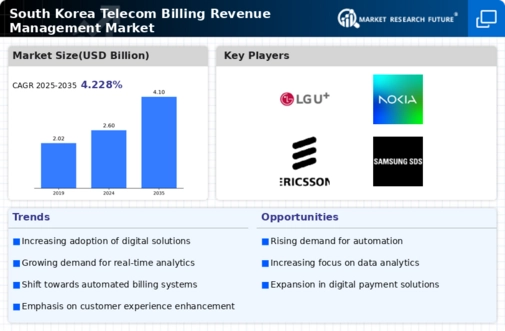The South Korea Telecom Billing Revenue Management Market is characterized by rapid technological advancements and dynamic competition among key players. As the telecommunications industry evolves, billing and revenue management systems have become critical in effectively managing financial operations, optimizing customer experiences, and ensuring precise revenue capture. This market is influenced by factors such as increasing digital service adoption, regulatory requirements, and the need for innovative billing solutions that cater to diverse customer requirements.
The competitive landscape is shaped by the continuous enhancement of service offerings, partnerships with technology providers, and the implementation of advanced analytic tools, which aim to drive efficiency and performance in revenue management practices.
LG Uplus has established itself as a prominent player in the South Korea Telecom Billing Revenue Management Market, showcasing a robust portfolio of strengths that enhance its market presence. The company has invested significantly in developing advanced billing solutions that facilitate seamless integrations and support diverse payment methods, catering to the increasingly digital consumer landscape. LG Uplus is known for its commitment to delivering exceptional customer service, which has earned it a loyal customer base and a competitive edge.
Additionally, the company has leveraged partnerships and collaborations with technology vendors to enhance its service offerings and optimize billing processes, allowing it to stay ahead in a highly competitive environment while maintaining a strong market position.
SK Telecom is a leader in the South Korea Telecom Billing Revenue Management Market, recognized for its comprehensive suite of services that includes innovative billing solutions tailored to both individual and enterprise customers. The company excels in offering real-time billing, flexible payment options, and detailed reporting tools that enhance financial transparency and customer satisfaction. SK Telecom’s strength lies in its continuous investment in technology and infrastructure, as well as strategic mergers and acquisitions aimed at expanding its capabilities and product portfolio. This has enabled SK Telecom to maintain a dominant market share and respond effectively to changing consumer demands.
Through its robust service offerings and commitment to innovation, the company remains a key competitor in the billing and revenue management sector within South Korea.














